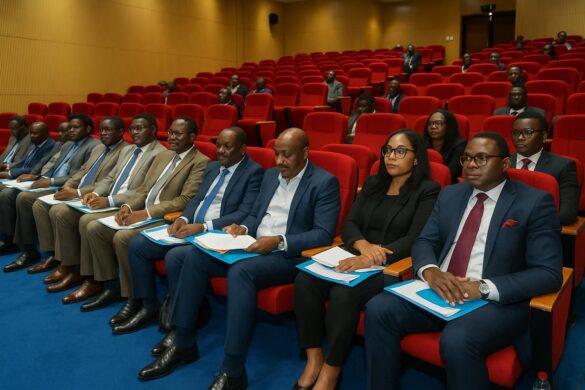Mid-Term Progress Status of the PATN Project
The Steering Committee for the Acceleration of the Digital Transition Project, better known by its acronym PATN, met on October 8th in a hotel in downtown Brazzaville to review a detailed preparatory report for the World Bank’s mid-term evaluation.
This meeting provided officials with a rare opportunity to assess two years of implementation, acknowledge successes, and identify areas needing correction before the final December 2027 deadline—a horizon still distant but rapidly approaching in terms of project management.
Strategic Mission of the Steering Committee
The exercise was presented as a routine procedure, noting that international donors now expect mid-term self-evaluations as proof of accountability and local ownership.
It was reiterated that the PATN is intentionally cross-cutting, affecting telecommunications, finance, health, education, and the modernization of the civil service, meaning delays in one ministry can have repercussions across the entire digital ecosystem.
The chairman welcomed what he called a “second wind” for the program, emphasizing that the committee’s role is to provide high-level arbitration on annual work plans and budgets so technicians can focus on fiber trenches, data platforms, and citizen-centric e-services.
Funding Flow and Disbursement Pace
During the briefing, the coordination team presented a dashboard indicating that approximately 40% of the $100 million envelope—co-financed by the World Bank and the European Union—has been committed to contracts covering main infrastructure extension, rural connectivity pilot projects, and government data center upgrades.
Disbursement is slightly above the regional average for similar digital projects, according to internal comparisons, but field feedback suggests absorption capacity will be tested when larger infrastructure packages move from procurement to execution in 2025.
Early Field Results
The mid-term report highlights early successes: over 200 kilometers of metropolitan fiber have been deployed in Brazzaville and Pointe-Noire; a cloud-ready platform now hosts six flagship e-services, including online business registration; and 1,500 civil servants have completed basic digital literacy modules delivered by the National School of Administration.
Small entrepreneurs who started a design studio this year say that “registering a business online in two days feels revolutionary compared to the paper maze we knew,” a testimony the committee cites to emphasize tangible impact.
Persistent Connectivity Gaps
However, connectivity gaps persist in departments like Likouala, where river geography complicates cable deployment and where the satellite backup solution remains expensive.
Procurement cycles have lengthened due to new layers of due diligence related to environmental safeguards, a development praised by conservation groups but lamented by local entrepreneurs who argue that exchange rate volatility reduces the value of fixed-price bids during extended evaluation periods.
Ongoing Corrective Measures
To resolve these frictions, the steering committee adopted recommendations ranging from real-time dashboards accessible
